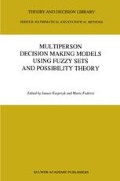Abstract
The paper discusses the problem of aggregating fuzzy individual preferences into fuzzy group preferences. The problem is posed in the ‘ordinal’ fuzzy set theoretic framework. The structure of aggregation rules satisfying unanimity and independence is explored, given the assumption of maxmin transitivity for group as well as individual preferences. Characterizations are given for certain types of aggregation rules based on consensus pooling and for generalised rank-based rules.
Access this chapter
Tax calculation will be finalised at checkout
Purchases are for personal use only
Preview
Unable to display preview. Download preview PDF.
References
Arrow, K. J. (1963), Social Choice and Individual Values; second edition. New York: John Wiley and Sons.
Barrett, C. R. and P. K. Pattanaik (1989), ‘Fuzzy Sets, Preference and Choice: Some Conceptual Issues”, Bulletin of Economic Research, 41, 229–253
Barrett, C. R., P. K. Pattanaik and M. Salles (1986), “On the Structure of Fuzzy Social Welfare Functions”, Fuzzy Sets and Systems, 19, 1–10.
Barrett, C. R., P. K. Pattanaik and M. Salles (1987), “On Choosing Rationally when Preferences are Fuzzy”, mimeograph; forthcoming in Fuzzy Sets and Systems.
Basu, K. (1984), “Fuzzy Revealed Preference Theory”, Jounral of Economic Theory, Vol. 32, 212–227.
Basu, K., R. Deb and P. K. Pattanaik (1988), “Soft Sets: An Ordinal Reformulation of Vagueness with Some Applications to the Theory of Choice”, mimeograph.
Blin, J. M. and A. B. Whinston (1973), “Fuzzy Sets and Social Choice”, Journal of Cybernetics”, 4.
Blin, J. M. (1974), “Fuzzy Relation in Group Decision Theory”, Journal of Cybernetics“, 4.
Dasgupta, M. and R. Deb (1988), “Fuzzy Choice Functrions”, mimeograph.
Dimitrov, V. (1983), “Group Choice under Fuzzy Information”, Fuzzy Sets and Systems, 9, 25–39.
Gibbard, A. (1969), “Intransitive Social Indifference and the Arrow Dilemma”, mimeograph.
Goguen, J. A. (1967), “L-fuzzy Sets”, Journal of Mathematical Analysis and Applications, 18.
Leclerc, B. (1984), “Efficient and Binary Consensus Function on Transitively Valued Relations”, Mathematical Social Sciences, 8, 46–61.
Nurmi, H. (1981), “Approaches to Collective Decision Making with Fuzzy Preference Relations”, Fuzzy Sets and Systems, 6, 249–259.
Ovchinnikov, S. V. and V. M. Ozernoy (1988), “Using Fuzzy Binary Relations for Identifying Non-inferior Decision Alternatives”, mimeograph.
Sen, A. K. (1970), Collective Choice and Social Welfare. Amsterdam: North-Holland Publishing Company.
Subramanian, S. (1987), “The Liberal Paradox with Fuzzy Preferences”, Social Choice and Weflare, 4, 213–223.
Tanino, T. (1984), “Fuzzy Preference Orderings in Group Decision Making”, Fuzzy Sets and Systems. 12, 117–131.
Author information
Authors and Affiliations
Editor information
Editors and Affiliations
Rights and permissions
Copyright information
© 1990 Kluwer Academic Publishers
About this chapter
Cite this chapter
Barrett, C.R., Pattanaik, P.K. (1990). Aggregation of Fuzzy Preferences. In: Kacprzyk, J., Fedrizzi, M. (eds) Multiperson Decision Making Models Using Fuzzy Sets and Possibility Theory. Theory and Decision Library, vol 18. Springer, Dordrecht. https://doi.org/10.1007/978-94-009-2109-2_14
Download citation
DOI: https://doi.org/10.1007/978-94-009-2109-2_14
Publisher Name: Springer, Dordrecht
Print ISBN: 978-94-010-7448-3
Online ISBN: 978-94-009-2109-2
eBook Packages: Springer Book Archive

